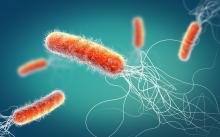Carbapenem-Resistant Pseudomonas aeruginosa
Pseudomonas is a type of bacteria commonly found in the environment, including in soil and water. One species of this bacteria, Pseudomonas aeruginosa, can cause infections in humans including pneumonia, bloodstream infections, and surgical site infections. Some Pseudomonas aeruginosa bacteria are resistant to antibiotics, and those that are resistant to a group of antibiotics called carbapenems are especially concerning.
Carbapenems are considered the last line of defense to treat multidrug-resistant bacterial infections, so infections caused by carbapenem-resistant Pseudomonas aeruginosa (CRPA) can be very difficult to treat.
Also, some types of this organism (carbapenemase-producing CRPA) can pass on their resistance to carbapenem antibiotics to other bacteria and can lead to widespread antibiotic resistance.
Healthy people do not usually get CRPA infections. Those most at risk for CRPA infection are people with:
- Longer hospital or long-term care facility stays
- Open wounds
- Invasive devices, like ventilators or urinary catheters
- Weakened immune systems or chronic lung disease.
CRPA can be spread person-to-person in health care settings through direct contact with patients and residents who are colonized or infected with CRPA, by health care workers’ hands following care of those individuals, or from contaminated surfaces in the patient’s or resident’s environment.
Symptoms of CRPA infection will depend on which part of the body is affected.
CRPA can cause different types of infections, such as pneumonia, bloodstream infections, and surgical site infections.
Because there is such a wide range of symptoms, a laboratory test is needed to see whether a patient has CRPA.
The most commonly prescribed antibiotics are not effective against CRPA infections.
Treatment decisions should be made on a case-by-case basis by a health care provider.
Colonized individuals who do not show active signs of infection do not need to be treated or decolonized.
Resources
- Carbapenem-resistant Pseudomonas aeruginosa, P-03232c (PDF): Fact sheet for health care settings. Educational fact sheet for the general public on CRPA in health care settings
- About Pseudomonas aeruginosa: CDC (Centers for Disease Control and Prevention) webpage, including information on symptoms, diagnosis, treatment, and prevention
As of July 1, 2022, carbapenemase-producing carbapenem-resistant Pseudomonas aeruginosa is a Category II reportable communicable disease condition in Wisconsin. Data on CP-CRPA cases prior to 2022 are based on voluntary reporting of isolates by clinical laboratories to the Wisconsin State Laboratory of Hygiene.
Find case data and prevention and reporting information on CP-CRPA and other multidrug-resistant organisms on the Reportable Multidrug-Resistant Organism webpage.
Wisconsin Department of Health Services resources
- Carbapenem-resistant Pseudomonas aeruginosa: Fact Sheet for Health Care Settings, P-03232c (PDF)
- Reportable Multidrug-Resistant Organisms webpage
CDC resources
Questions about carbapenem-resistant Pseudomonas aeruginosa? Contact us!
Healthcare-Associated Infections Prevention Program webpage | Phone: 608-267-7711 | Fax: 608-266-0049

